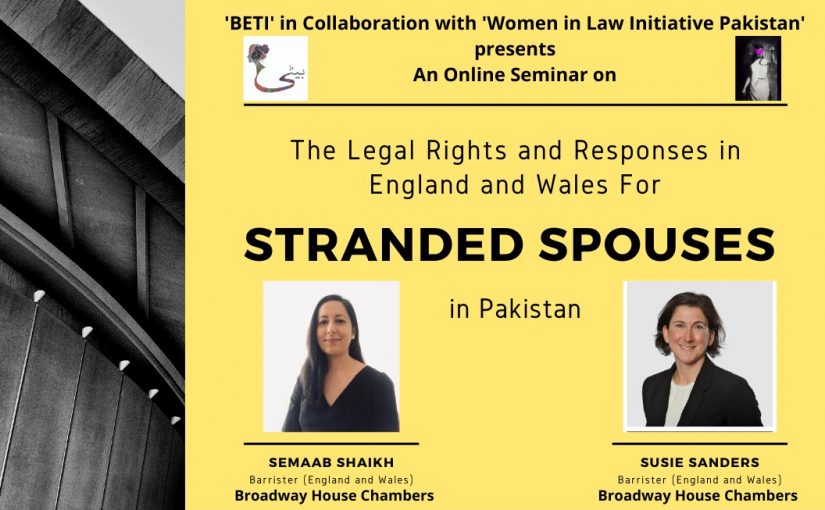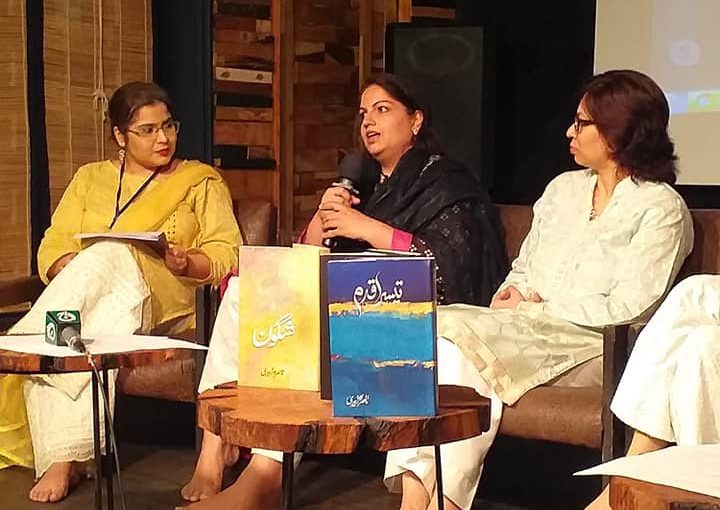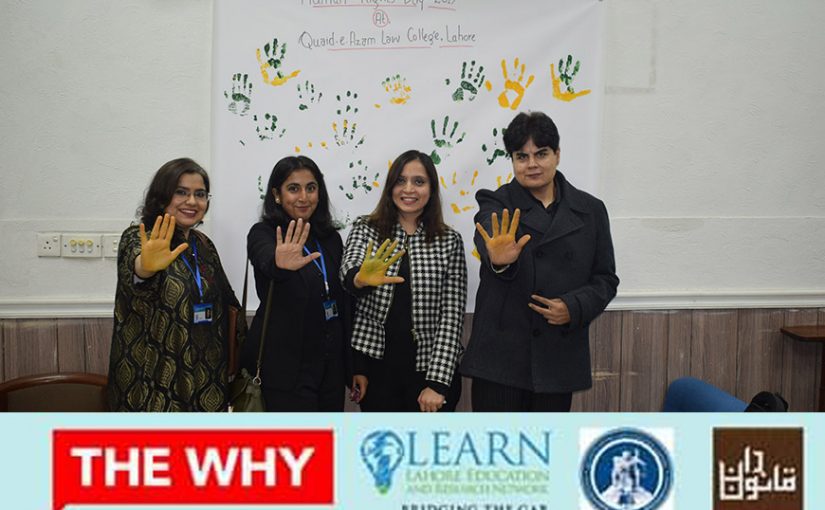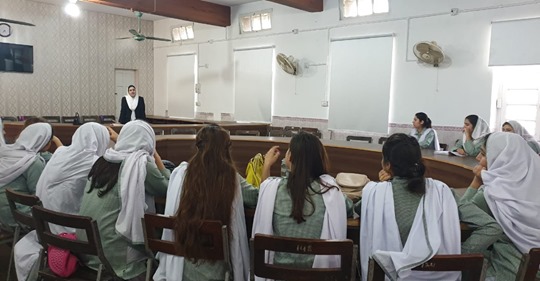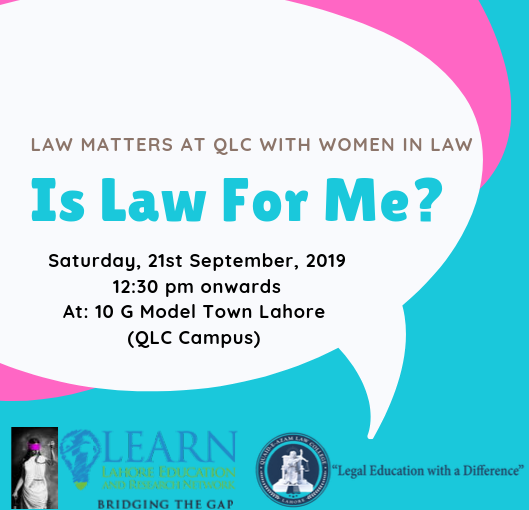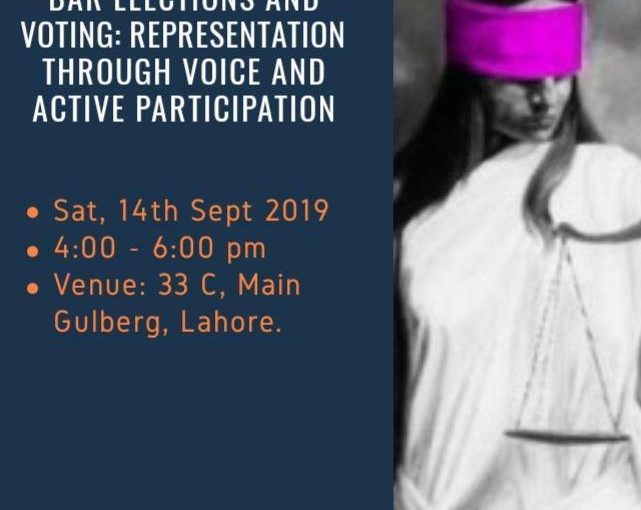Press Release: Legal Rights and Responses in England and Wales for Stranded Spouses in Pakistan
Thursday, 4th June 2020: Women in Law Initiative Pakistan in association with BETI organised an online session on the legal rights and responses in England and Wales to stranded spouses in Pakistan. The session was led by Barristers Semaab Shaikh and Susie Sanders from Broadway House Chambers, UK.
Barrister Semaab opened the session with a definition of a ‘abandonment’ as laid down in the Practice Direction 12 J of Family Procedure Rules 2010 and highlighted the gendered aspect of the definition explaining that it only applies in the case where a husband who is a UK national abandons his foreign national wife in order to prevent her from asserting residential or matrimonial rights in the UK.
She also highlighted that the spouses most vulnerable to abandonment are those who have suffered some form of domestic abuse and retention of their passport and other documents by their in-laws or husband. These are typically the spouses who are financially and otherwise dependent on their husbands for their accommodation and immigration status and who may have little or no English language skills which makes them more susceptible and vulnerable to such abuse.
The immigration rules in UK currently have limited rights for spouses who may be victims of domestic abuse in UK. The concession allows survivors of domestic abuse to apply for indefinite leave to remain however, such a concession is only available where the applicant is in UK and must show that the relationship broke down as a result of the abuse suffered. Stranded Spouses in jurisdictions outside of the England and Wales, such as when wives are abandoned back in Pakistan, have no rights to access this concession even if they have children or financial resources in the UK.
The approach of the family courts, particularly of Mrs. J. Hogg in leading cases suggests that the courts are more open to considering the peculiar position of stranded spouses and have pleaded to the immigration authorities to allow the mother to enter the country for the purposes and duration of proceedings in the family court at least.
The speakers then spoke about their own recommendations on what needs to change within UK so as to make the legal position better for stranded spouses such as for instance ensuring that abandonment is recognized a s a form or type of domestic abuse within the definition of domestic abuse in the proposed Domestic Abuse Bill. The speakers also highlighted what lawyers based in Pakistan could do to assist such clients from Pakistan; in particular, Barrister Susie laid stress on the need to create awareness in Pakistan among women BEFORE they get married to foreign nationals so that they are aware of their rights, legal position and remedies to access justice. Writing letters to MPs in UK and explaining the legal position and factual circumstances of the victims was also recommended.
There is clearly a need for more cooperation amongst the agencies in both countries for meaningful assistance to be provided to the affected persons in such scenarios.
Contact: info@learnpak.com.pk
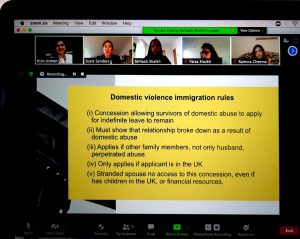
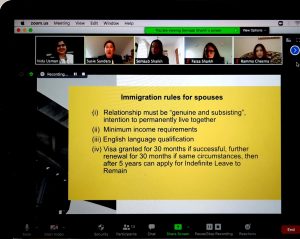

Press Release: Piracy and The Writing Industry
Thursday, 23rd April 2020: On the World Book and Copyright Day 2020, celebrated by UNESCO on the 23rd of April annually, the Lahore Education and Research Network (LEARN) and The Writing Institute jointly organized an online session on ‘Piracy and the Writing Industry’.
This session also marked the one year celebration of #RethinkingWriting as an industry – an initiative by LEARN to promote authors, and support writers, publishers and other agents involved in the literary process via creating awareness around their labour and highlighting their pressing and collective needs as an industry to secure their rights. It further aimed to create awareness around writing as an industry at a macro level, so that writing as a craft can be rethought of as a career path for those who wish to pursue this professionally. The initiative endeavoured to create awareness around need for creating an enabling environment and for developing the infrastructure for the work Pakistani writers to cross over to larger markets. In this regard, several policy changes that are required were highlighted and engaging sessions and discussions were organized to develop a collective voice identifying the challenges and enlisting the recommendations for reform and way forward for Pakistan to be able to take its stories, its legends and its softer image to a global audience.
Authors Faiqa Mansab, Sara Naveed, Mehr F Husayn and Awais Khan joined the conversation as panelists. The conversation was moderated by Nida Usman Chaudhary, founder of LEARN.
The discussion centered around four points which included amongst others, taking stock of the state of piracy in Pakistan and its implications on the authors and the writing industry as a whole. In responding to the question about her experience with piracy, author of four books, Sara Naveed said,

“I have been a victim of piracy and have seen pirated copies of at least three of my books being sold for as low as Rs 150/- on various book shops. The ready access to cheaper unauthorized copies directly affects the rights of the author and the publisher but still there is rampant practice of selling illegal and unauthorized books in the market.”
It was noted that book piracy can lead to substantial economic loss and revenue. Nida Usman shared harrowing numbers with the panelists and stated that she found loses being valued at over Rs. 40 million annually due to book piracy in Pakistan by several industry experts and publishers. “The issue of book piracy is therefore, not just about the infringement of personal rights of the authors and/or publishers, but also about the deprivation of revenue and loss to the country’s national exchequer on the whole”, she added.

Author of ‘In the Company of Strangers’ and founder of The Writing Institute Awais Khan stated that he will take legal action against any sellers of pirated copies of his book and will report all social media posts and pages advertising the same. “It is these pages that are the hub from where these sellers operate nowadays and I will report them to all relevant authorities,” he explained.

Mehr F Husayn expressed her dismay over lack of outrage against piracy in the country as well as the lack of awareness that selling pirated copies is a crime. She said, “[piracy] amounts to stealing someone’s hard work. When an author puts in their heart and soul into a project they have every right to share what they are suffering as a result of piracy or other discriminatory policies hampering their book and its access to markets and to take necessary action where need be to curb such a menace.” She stressed on the importance of seeking legal advice throughout the publishing and distribution process as a measure that an author can take to protect their interests.

“Is it however, fair to put the entire burden on authors to keep track of piracy of their books and to press for action against it?” asked Nida.
The panelists commented that it was not and agreed that a collective voice was needed to amplify their rights and take up these matters officially with the authorities and concerned persons. They noted that despite there being law on paper, not much was implemented as with all other laws and if the authorities would be doing their job this wouldn’t fall onto the shoulders of authors. The support structure however, was missing from the writing scene in Pakistan and they urged all stakeholders and the readers to support them in this process.
The panelists seemed to agree that one of the reasons that piracy was so rampant in Pakistan was the flawed argument that people cannot afford books at their original market price. Mehr questioned whether such unauthorized publications would be allowed to continue if the books of Pakistani authors were published by local publishers. “Had the publishers of these books been local, we might have seen a stronger response and reaction against pirated copies,” She added.
“There is a strong and dire need to create awareness around piracy – which is a crime as it is, in order to curb this menace,” said Faiqa Mansab. She agreed that economic argument from the perspective of losses to Pakistan as a whole and to the writing industry in particular could be a good way to challenge piracy. She also highlighted that there was a difference between ‘piracy’ which is unauthorized reproduction of an author’s work and ‘distribution’ and that there should be no confusion that, “as authors we stand against piracy and not against distribution of original work.”

“The answer to your question on balancing rights of access to books in a poor country like Pakistan vis a vis preserving the intellectual rights of the authors lies in rethinking libraries,” suggested Awais Khan.
“We just want the readers to appreciate and understand why it is important to invest in the original books and if someone cannot afford the original book, it is better to ask friends around to lend the book for reading or develop books clubs and other reading communities to share books even if investment in revamping public libraries is a distant goal,” he added. “Nowadays, it is not just a challenge of fighting piracy on ground but a bigger challenge is to fight online piracy in shape of PDF versions of the books which get circulated even before the official release of the original books,” he highlighted.
However, as pointed out by an attendee, original books published abroad can take years to reach Pakistan and avid readers are left with no options other than to request or look for PDF versions. He suggested that concerted efforts to improve the supply chain and market access could reduce the need to resort to these measures. The panelists were happy to engage with the audience and to take their feedback.
A Short Online Session on Piracy and The Writing Industry
To mark the 1 year celebration of our #RethinkingWriting initiative, Lahore Education and Research Network is jointly hosting a short online session on ‘PIRACY & THE WRITING INDUSTRY’ along with The Writing Institute tomorrow from 3:30 to 4:10 pm.

Panelists include:
1. Faiqa Mansab (Author)
2. Mehr F Hussayn (Author/Editor)
3. Sara Naveed (Author)
4. Awais Khan (Author/Founder – The Writing Institute
5. Bilal Zahoor (Folio Books/Publisher)
6. Nida Usman (Moderator)
Discussion Points:
1. The state of piracy in Pakistan and its implications on the business/authors
2. What steps are needed to address the issue of Piracy and who has the responsibility for this?
3. Right to Access vs IP Rights – case for reviving public libraries?
4. Book bans, piracy and hostile policies
How to Join the Meeting?
Join Zoom Meeting
https://zoom.us/j/94566266269
Meeting ID: 945 6626 6269
Celebrating 1 Year of #RethinkingWriting Initiative
A year ago we at Lahore Education & Research Network – LEARN started to work on #rethinkingwriting as an industry with Olomopolo Media in order to draw attention to the scope and potential of investing in this craft and what it can do for Pakistan in terms of taking its stories out there to the world.

One year on, we can truly say that the authors in this country and those supporting them and the publishers and other literary folks have all contributed towards realization of this very thought and we have seen a lot of interesting developments taking shape in Pakistan as regards writing; be it in shape of literary festivals and awards such as the zeenat haroon award or the work of many of our authors being published in the region and abroad or be it Awais Khan’s (author of ‘In the Company of Strangers and Founder of The Writing Institute) phenomenal success with bridging the gap between Pakistani authors and foreign literary agents and publishers, the Pakistani authors have come a long long way.

Also Naima Rashid deserves a special mention for resurrecting Parvin Shakir’s poetry and putting it out there on the world map through her exceptional work in translating the same, which is also an intensely creative process full of immense responsibility shows that there is huge potential and high hopes from our people.

It is now up to the government and the industry to rethink writing and create an enabling environment for access to better printing material, more international outreach and liaison with agents and relevant bodies and other infrastructural support for the production of world class books in Pakistan and their distribution so that our budding publishers like Folio Books and Mongrel Books among others can continue to support and publish local work for a global audience.
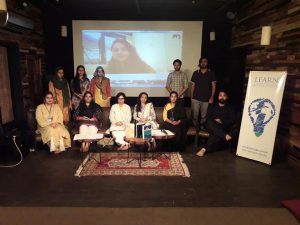
‘The Why’ Films Festival 2020
We are launching inaugurating ‘The Why Films Festival 2020′ at Olomopolo on Sunday 26th January 2020 from 3 to 5 pm.
THE WHY FOUNDATION is a charitable organization that supports sustainable development by securing free access to reliable information for millions of people around the world. They produce and distribute documentaries & multimedia content about human rights, democracy, justice and equality. Their documentaries are used in schools, community centres, public cinemas and brought to citizens at large through their growing network of 70+ public service television stations in 200 countries and territories.
As their licensed partners, LEARN will be showcasing 4 of their short films each based on women, gender equality and related human rights issues. Each film is under 3 minutes and leaves the viewers with thought provoking material. The screenings will be followed by thematic discussions based on each film in a local context.
The themes we have selected are as follows:
1. What is the impact of the early forced marriage of girls?
2. Why is girls’ access to education so important for gender equality?
3. How does access to sanitation affect women and girls around the world?
4. Girls’ and women’s economic empowerment





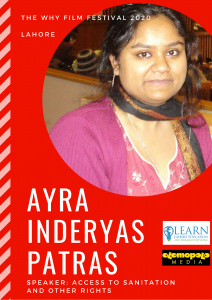
Human Rights in The Age of Climate Emergency & Toxic Air – Dec 10, 2019
We marked Human Rights Day 2019 at Quaid E Azam Law College with a half day conference on ‘human rights in the age of climate emergency and toxic air’.
We are indebted to Ali Mazhar of Ain Adab for opening our event with his riveting words of poetry written especially for the climate march 2019 in September. We thank him for re-presenting it for us at the session.
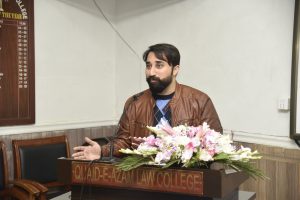
Pakistan is the 5th most vulnerable country on the climate impact index and given the poor air quality situation in the country which impacts not only the health, life and safety of its citizens but also hampers access to education and enjoyment of life and its quality for our children.
To draw attention to this important matter and to have the most common but pressing queries answered, we had with us Climate Change expert and legal consultant Sara Hayat, member of Climate Action Pk, Ms. Aysha Raja and three lawyers leading the climate litigation in Pakistan, Advocate Aneesa Agha, partner at RMA & Co and one of the leading members of Women in Law initiative, Environmental Lawyer Rafay Alam and Barrister Amir Zafar Khan.
Sara Hayat spoke about impact of climate change and the vulnerability of women to it. She shared her research related to gendered dynamics and impacts of climate change and concluded that climate change hits us all, but not equally – a point also established in short film produced by TheWhy Found ‘it started with a duck’ which was shown for the first time in Pakistan under our license with them. Sara highlighted not one but around five various impacts of climate change on women including but not limited to:
1. loss of income and livelihood due to impact of climate change on agriculture
2. climate induced migration and loss of privacy and family home and security of person
3. water shortages and walking for over 2 km everyday often more than once to provide water for domestic consumption and use, contributing to back aches, headaches and susceptibility to harassment along the way.
4. threat to life as less trained and equipped with life skills such as swimming in order to survive flood related catastrophes
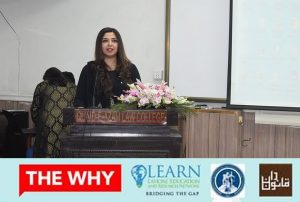
The video raises important questions of survival and adapting to combat climate change and secure the best possible chances of our livelihoods and existence in face of a looming crises.

Aysha Raja gave an in-depth presentation on smog, what it is made up of (PM 2.5) and how dangerous that is for human health and life. She discussed in detail the air quality index and trained on how to read the air quality readings from the air visual app. She disclosed a number of action steps that we could take to reduce our individual as well as collective carbon footprint, of which the most paramount was the suggestion that we adopt mass transit and busses for commute to reduce dependency on cars given that fuel and transportation sector was the major cause of deteriorating air quality in Punjab. Ultimately, she encouraged the participants to get more involved and equipped to call for more robust action by concerned officials and authorities as far as implementing mitigation measures were concerned.
The panel discussion on climate litigation paved the way for a very interesting discussion on using enforcement of fundamental human rights via writ petition in the high court as a means to enforce climate related commitments and other actions.
Advocate Aneesa has filed a petition referring to Paris agreement and calling for reduction in emissions as agreed by the government citing impact of climate change on women.
Rafay Alam recently filed a case on behalf of children who are affected by air pollution of which one is a young professional athlete unable to train for her sport due to toxic air quality.
Barrister Amir’s petition focuses on quality of fuel being used in Pakistan which falls way below the cleaner fuel standards globally such as Euro 4 and onwards.
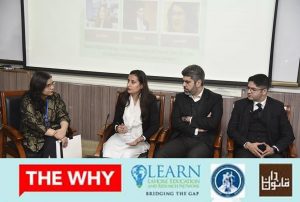
All three cases are subjudice and a final decision is awaited however, the panelists did explain the basis of their arguments and answered the question as to why a writ seeking enforcement of fundamental rights was adopted as the way forward to proceed in such matters, how the two were connected and what it tells us about course of environmental legislation in Pakistan, which is inadequate and ill-equipped to have the ‘teeth’ needed to make an impact in this grave matter of public importance.
Several myths were debunked during the conversation and a few participants engaged with the panelists bringing forth their local environmental issues and challenges. For instance, it was discussed how renewable energy was actually cheaper than fossil fuel based energy sectors and yet, it was not the sector which the government was tapping for meeting the demand for electricity.

A very interesting observation was in relation to how some of the historical and older environmental cases were discussed and their impact assessed on whether or not there is or ever has been an environmental movement of sorts in Pakistan and whether in contemporary days, its time had arrived. As agreed by all participants, there is clearly a lot more left to be desired on many levels of policy, implementation, funding as well as legislation to really bring these arguments to the heart of every development agenda in Pakistan.
A befitting closure to the day’s activities came in the form of circulation of a compilation by climate action pk on some of the leading but easy to read articles related to climate change and all the attendees leaving behind their handprints as a sign of commitment and pledge to human rights in the age of climate emergency and toxic air.
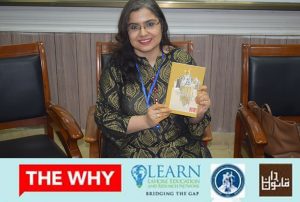

The event was covered by Qanoondan.
#TeamLEARN
Press Release: Doctors and residents demand meaningful action on health emergency caused by air pollution
On Thursday, Nov 14th, 2019 concerned residents donned masks and joined up with doctors outside of the Allama Iqbal Medical College in Lahore, where they held a press conference on the deeply worrying public health emergency resulting from toxic air pollution.
Senior medical doctor and researcher, Dr Zulfiqar Mir, began the press conference with troubling statistics from a recent study, stating that approximately 135,000 people die prematurely every year in Pakistan due to air pollution. “Most of the deaths occur in Punjab, especially in Lahore. This is a public health emergency. We want the environmental, health and climate departments to take note of this critical issue.”
According to the government’s own clean air policies, emergency measures should be taken to reduce the air and safeguard the public’s well-being. Yet too little is being done during the immediate crisis this winter, nor towards the required medium and long term measures to radically reduce the hazardous air pollution in Pakistan.
For this reason, doctors, along with scientists and environmentalists, launched a petition demanding that the government implement the existing smog and clean air policies, and go even farther to actually stop the pollution from happening to safeguard the public’s health. The petition has received widespread public support.
“Over a short period of time this petition was signed by 5000 concerned residents”, said Dr Alia Haider.
She outlined the necessary measures delineated in the petition. These include transforming the two largest polluting sectors—transport and health– by building a sustainable public transport infrastructure and getting polluting vehicles off the road, shutting down industrial units that are violating regulations, shutting down coal-fired power plants and transitioning to renewable energy production.
Pediatrician, Dr Intesar, and ENT, Dr ShahRukh, discussed the health impacts of breathing air filled with carcinogens and particulate matter that is absorbed into the body’s organs. They explained how the pollution is particularly dangerous for pregnant women and young children, as well as for elderly people and those with compromised immune systems.
They stressed the dire need for an adequate health budget and free care for the poor, both demands included in the petition. The petition also demands the strengthening of Pakistan’s public health institutions to empower medical experts and researchers so that they can develop systems that ensure adequate care for all in need.
Lawyer and mother, Nida Usman Chaudhry, explained how she is fearful of sending her son, who already has experienced respiratory problems for half of his young life, to school or anywhere out of the house during peak smog season. She said this smog is literally killing our children and makes parents feel as afraid to send their kids to school as they felt after the APS tragedy in 2014.
School student Eesa Ali Mir spoke of how the children’s bodies and brains are being ruined by the smog. “It is about our future and we will fight to save it. If we don’t do anything right now then we will run out of time.”
In addition to the children in attendance who are learning how to stand up for their rights, university students also argued that it if the government is failing it is their right to stand up and protest. Mohsin Abdali, MPhil student at Punjab University’s Department of Agricultural Sciences, said “Every other student is sick on campus. Many are forced to miss their exams and assignments due to deteriorating health. We don’t want any masks or school shutdowns from the government. We want policies that address the root causes of the problem. ”
4th year student at GCU, Salman Sikander, agreed, speaking of how the government is also cutting budgets in education as well as in health sector. But affirmed that like doctors, students are also getting organized. “This government has abandoned ordinary people and seems more interested in facilitating the powerful polluters. This is the responsibility of the government to regulate industries and make policies that improve the environment of the city.”
Medical professionals, academics, students and environmentalists will continue standing together to ensure their demands for basic dignity and safe living conditions are met.
Women in Law KP Chapter launched with Session 1 on Rights of Women in Law and Sharia
Pakistan Human Rights Movement in Collaboration with #WomenInLaw #KPChapter and University of Home Economics organised a session on Rights and Privileges given to women by law and Islam: Nikkah, Dower, Maintenance, Divorce, Inheritance.
The session was held on 18th of October 2019 at College of Home Economics, University of Peshawar, Khyber Pakhtunkhwa and was led by Advocates Mehwish Muhib Kakakhel, Zeenat Muhib & Kainat Muhib.
The session aimed to highlight the rights Pakistani law and Shariah has provided women in family sphere.
Advocate Zeenat Muhib Kakakhel and Kainat Muhib Kakakhel explained clauses of Nikkahnama from legal perspective and how it is to be properly filled and where it is submitted for registration.
Majority of the participants stated that prior to the training they were not aware of the clauses mentioned in Nikkahnama except that of Haq Mehr.
Students were given an extensive study on dower, entitlement to maintenance of women and her children.
Difference between divorce pronounced by husband, judicial divorce and ‘khula’ were also explained with the help of laws and judgments of Pakistani courts.
Students were actively participating by asking questions and each question would give rise to other questions which made the session not only interactive but also informative for all the participants.
Participants were then given an awareness session on the laws of inheritance by Mehwish Muhib Kakakhel. Most of the students during this session shared some stories in which women were deprived of this right. Most of them were asking questions which someone they know had faced and were showing keen interest in learning about their right to inheritance. Students were also introduced with the KP Enforcement of Women Ownership Rights Act 2012 that by this law no one can deprive women from their right of ownership, be it their Haq Mehr, property etc.
The event was concluded with Ms. Nuzhat Firdous, Chairperson, Department of Human Development and Family, University of Home Economics thanking and presenting a little gift to Mehwish Muhib Kakakhel as a token of love and respect.
Recommendations:
1. More Awareness sessions need to be scheduled for more nuanced understanding of laws and rights among the law students.
2. access to resources and publications to be made easier for the students.
Is Law For Me?
Wondering whether Law is for you or not?
The Women in Law Initiative join hands with Quaid E Azam Law College to bring to you a series of conversations titled, “Law Matters at QLC with Women in Law”.
We are very excited to be launching this with an introductory session for students exploring law as an option.
The session titled ‘Is law For Me?’ will help address some of the basic queries that students considering this degree may have towards the degree itself or the profession in general. It will also highlight the more intricate discussions with our panelists who, through their experience will share their journeys and help you navigate this field for you to be able to determine your prospects and areas of interest.
Given how vast a law degree is and the number of options it can offer, and what path to take to reach those options in practice and the requisite skill set that is required will all be covered.
Refreshments on the house.
Early registration is encouraged. To register: send your name, contact details and year of study to info@learnpak.com.pk
The event is open to all genders.
Who should attend?
> A level Students
> Prospective Undergraduate Students
> Mature candidates considering a shift in their careers or field and exploring law as an option
>Any one else interested in exploring how law is in practice, what the field holds and what it requires.
Bar Elections and Voting: Representation through Voice and Active Participation
Women in Law Initiative in association with RMA & Co Advocates and Legal Consultants is hosting a joint session on
“Bar Elections and Voting: Ensuring Representation through Voice and Active Participation”
as part of women in law dialogue series on Saturday, 14th September, 2019 from 4:00 to 6:00 pm at RMA & Co Office in Lahore (33 C, Main Gulberg, Lahore Pakistan).
The session will provide information regarding voter registration process and a chance to interact with our guest speakers who have served as office bearers and cabinet members. The session will bring forward their success stories and their experiences whilst in office and how they overcame their challenges.
We believe that engagement with bar members and participation in the representative process is an integral step towards advancement in the profession as well as towards contributing to a more inclusive and equal legal profession. It is our individual and collective responsibility as members of this fraternity to play our part and exercise our right to vote by electing members who are willing and able to represent us and our voices effectively at these representative forums.
We look forward to welcoming you all but kindly register as indicated below:
To Register: Please share your name, designation/work, contact details at info@learnpak.com.pk

